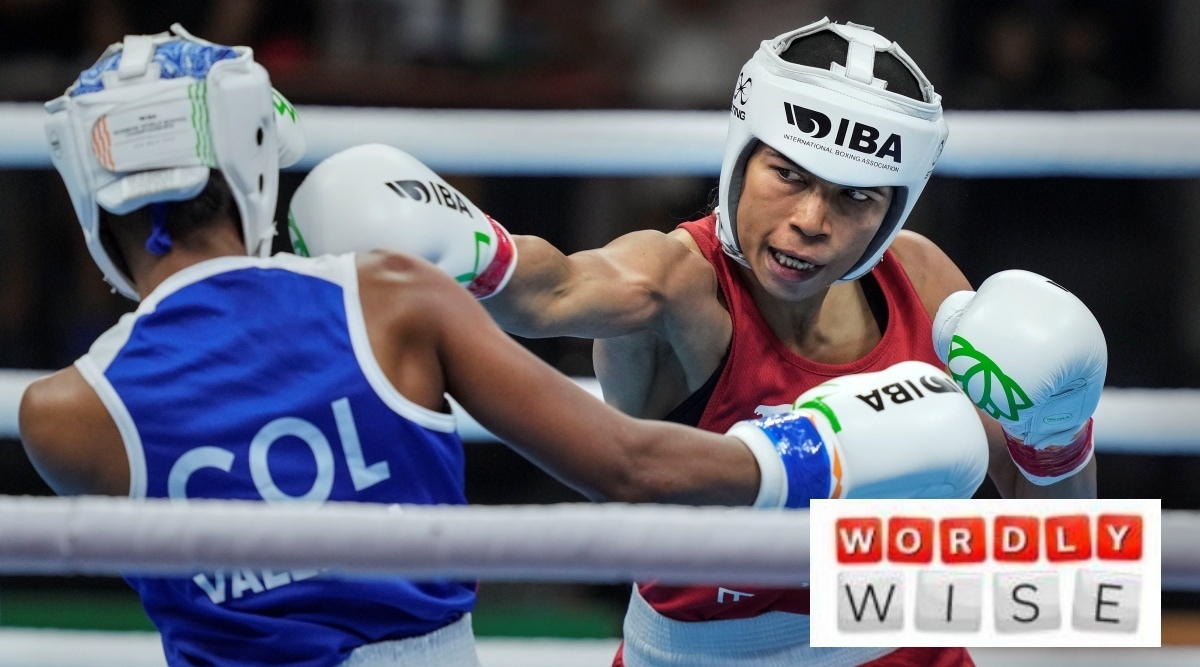Pack it like ’em: Some boxing metaphors that will add punch to your language
From palooka to rope-a-dope, boxing has provided the English language with many metaphors. After Indian women's historic performance at the IBA Women’s World Boxing Championship, a look at how the sport has influenced our lexicon.
 India's Nikhat Zareen (red) punches Colombia's Ingrit Valencia during their 50kg category semifinal bout at the 2023 IBA Women's Boxing World Championships, in New Delhi, Thursday, March 23, 2023. (PTI Photo/Gurinder Osan)
India's Nikhat Zareen (red) punches Colombia's Ingrit Valencia during their 50kg category semifinal bout at the 2023 IBA Women's Boxing World Championships, in New Delhi, Thursday, March 23, 2023. (PTI Photo/Gurinder Osan) The late Henry Cooper, whose deadly left hook was nicknamed ‘Enry’s Ammer’ (Henry’s hammer), remains the only British boxer to have received knighthood. He once said: “women are made for loving not hitting”. He would have to eat crow if he would be around.
For, the fantastic four of the Indian boxing, who recreated history 16 years on by winning four gold medals at the IBA Women’s World Boxing Championship held at New Delhi, would have made him think twice. When it comes to love for their country, women can certainly punch, and punch much above their weight.
Boxing, a not so popular game in India till our women pugilists started making their mark on the world stage, has lent English language quite a few words, idioms and phrases that are used almost every day. From general use to political discourse, the boxing imagery has the ability to add punch to written and spoken language. Here’s a look at some of them:
Two commonly used words – heavyweight and lightweight – owe their origin to the game. Professional boxers in fact are classified into 17 weight categories, which may vary slightly depending on the norms set by governing bodies. Heavyweight refers to the heaviest classification and, therefore, in general use means a person possessing power, prominence and stature. On the other hand, lightweight (though not the lowest classification; flyweight and bantamweight are among the classes below it) has developed its own meaning of “being one of little consequence or ability”.
For many, palooka owes its origin to Joe Palooka, a character in the 1930 newspaper comic strip created by Ham Fisher and has a negative connotation, meaning an inexperienced or incompetent boxer who has no business to be in the ring. In general use, it is a synonym for a rookie, a clumsy or a stupid person and also a term describing a horse which has a little chance of winning. Strangely, the character himself was a kind-hearted heavyweight prize fighter. Maybe the negative sense derived from the fact that he was not always willing to fight. However, it is also a fact that the term was already in use much before the comic strip came into existence.
Throw in the towel comes from the early 20th century boxing practice of throwing a white towel into the ring by the boxer’s trainer to signal to the referee that the fight was over. It now means to quit something, usually when someone is repeatedly failing at it. A less commonly used variant is to throw up the sponge.
Just opposite in meaning is the idiom, throw one’s hat in the ring, which implies that someone is game for a fight. The custom is traced back to 1800s when most men wore hats.
Fistic, used as an adjective, refers to boxing or fighting with the fists. A commonly used word, fisticuffs also means fighting with fists and appears to have come from fistic. However, the Oxford English Dictionary says the word is not in dignified use. Perhaps another adjective, pugilistic, derived from Latin ‘pugil’ (fist fighter) may be used more suitably for the profession. Though outdated, pugilist stands for a boxer.
An expression made famous by Muhammad Ali is rope-a-dope. This was the technique he employed to beat another boxing legend George Foreman in the famous 1974 ‘Rumble in the Jungle’ bout at Kinshasa, Democratic Republic of the Congo (then Zaire). Ali prevailed over the so-far-undefeated Foreman by dodging and tiring him. It now refers to a defensive posture on the ropes in an attempt to outlast an opponent by making his punches ineffective. Interestingly, almost a decade earlier Ali was felled by ‘Enry’s Ammer’ in one of the rounds against Cooper. However, the former went on to win the match eventually.
- 01
- 02
- 03
- 04
- 05






































